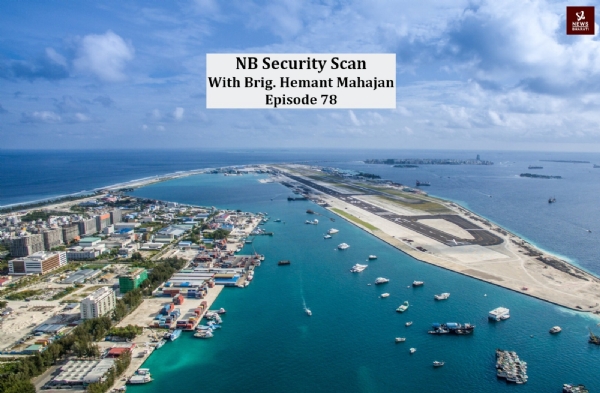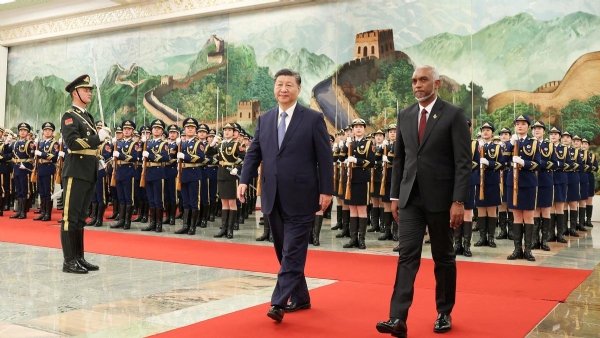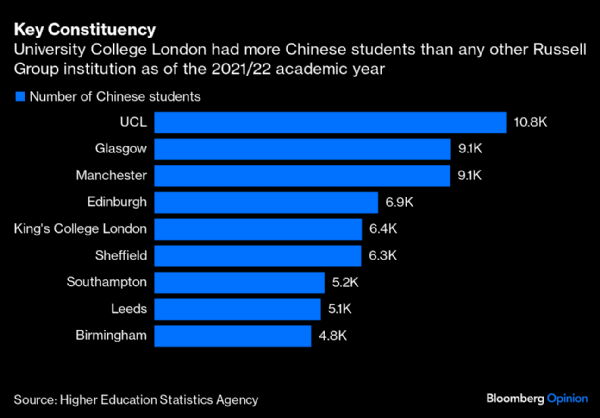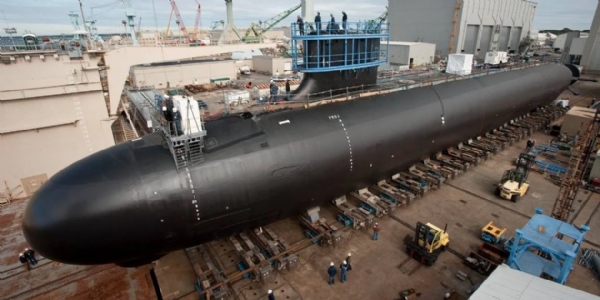#SecurityScan 78: China's Water wars, CCPs all out war against Hongkong & much more
The antenna deal would expand Japan-India security relations to defense equipment, which in turn would likely strengthen deterrence in the Indo-Pacific region.
Total Views |
This article is a summary of important events that have taken place in last one week affecting, India's national security

#COUNTERING CHINESE MULTI DOMAIN , GREYZONE, HIGH BREED WARFARE
TikTok Crackdown Shifts Into Overdrive, With Sale or Shutdown on Table
Legislation that would ban TikTok in the U.S. or force its sale is hurtling toward a vote in the House following months of behind-the-scenes efforts on Capitol Hill. The new push caught the service off-guard, ratcheting up interest from possible buyers and raising the possibility that one of the most popular apps in the country could soon be shut down.
Lawmakers have decried TikTok for years, expressing concern that the app’s Beijing-based parent would share data about its users with the Chinese government or lean on TikTok to promote Beijing’s propaganda and shape Americans’ political opinions. But there were countervailing concerns that a forceful move against TikTok would spark a backlash from the millions of users who have embraced the app.
Tibet boarding schools: China accused of trying to silence language
Tibetan educational sociologist Gyal Lo can speak Mandarin Chinese fluently - but he would rather not.
He has spent the last few years telling the world about Beijing's sweeping educational reforms in Tibetan areas, and would prefer not to use the language of people he identifies as colonial oppressors.
China has expanded the use of boarding schools - for children as young as four - and replaced Tibetan as the main language of tuition with Chinese.
Beijing says these reforms give Tibetan children the best possible preparation for their adult lives, in a country where the main language of communication is Mandarin Chinese.
US Key to Philippines’ Plan to Tap Oil, Gas in South China Sea
Philippines may invite US companies to join, ambassador says
Raimondo to visit Philippines, Thailand to strengthen ties
The Philippines is counting on the US and its allies to play a crucial role in its plans to explore energy resources in the disputed South China Sea, according to Manila’s envoy to Washington.
The country is seeking to parlay its deepening security ties with Washington into broader economic benefits, said Philippine Ambassador to the US Jose Manuel Romualdez.
The Implications of an Inverted Yield Curve on China's Economy
In recent times, a notable development has taken place within China's vast government bond market. The yield curve, particularly the spread between 30-year and 10-year bonds, has significantly narrowed, raising concerns akin to those experienced during the United States' yield curve inversion. This phenomenon has triggered discussions regarding potential repercussions for China's economy, including the specter of an "asset famine" and the looming threat of a prolonged recession. This is the implications of (almost) inverted yield curve on China's economic landscape.
Implications for China's Economy:
The implications of a (almost) inverted yield curve on China's economy are multifaceted and warrant careful consideration:
Financial Market Instability: A flattening yield curve can contribute to financial market instability, as investors may interpret it as a signal of economic uncertainty. This perception could lead to increased volatility in asset prices and capital outflows, posing challenges for policymakers tasked with maintaining stability.
Reduced Investment Incentives: An inverted or flattening yield curve can dampen incentives for long-term investments, as lower long-term yields may discourage investors from committing capital to projects with extended payback periods. This could hinder China's efforts to stimulate investment and foster sustainable economic growth.
Credit Market Tightening: A narrowing yield spread may also signal tightening conditions in the credit market, as banks and other financial institutions adjust lending practices in response to changing yield dynamics. This tightening could restrict access to credit for businesses and consumers, potentially constraining consumption and investment activities.
Pressure on Monetary Policy: Central banks, including the People's Bank of China (PBOC), may face increased pressure to respond to yield curve dynamics through monetary policy adjustments. However, navigating the delicate balance between supporting economic growth and managing inflationary pressures poses a considerable challenge, particularly in the context of external uncertainties such as trade tensions and geopolitical risks.
Risk of a Prolonged Recession: While an inverted yield curve does not guarantee an imminent recession, it does raise concerns about the potential for prolonged economic downturns. Given China's significant influence on the global economy, a protracted recession could have far-reaching consequences, affecting trade flows, commodity prices, and investor sentiment worldwide.
In conclusion, the (almost) inverted yield curve observed in China's government bond market has sparked legitimate concerns regarding its implications for the country's economy.
China says military delegation visited Maldives, Sri Lanka and Nepal

A Chinese military delegation visited the Maldives, Sri Lanka, and Nepal to discuss defense cooperation, aiming to strengthen ties and counter India's influence in the region. The visit follows the signing of a "military assistance" deal between China and the Maldives, which recently ordered Indian troops to leave. The delegation discussed military relations and regional security, reaching agreements to enhance defense cooperation. China's growing presence in the Indian Ocean and its relations with these countries have raised concerns in India.
Three more vessels to arrive at Vizhinjam port from China in April
Three additional vessels from China are scheduled to arrive at the Vizhinjam seaport next month, bringing a total of 17 cranes for the international deep-sea facility being constructed at a cost of Rs 7,700 crore, according to a statement by the Vizhinjam International Seaport Ltd (VISL). The ships are expected to reach the Vizhinjam coast on April 4th, 17th, and 23rd.
China's Water wars: How It Shapes Asia's Future?
China's construction of dams and infrastructure along rivers in Tibet has raised concerns about potential impacts on water availability and flow patterns in downstream regions.
While it's possible that water management strategies could be influenced by geopolitical considerations, such as exerting influence or leveraging power, it's crucial to approach this topic with a nuanced understanding. Factors such as hydrology, environmental concerns, economic development, and diplomatic relations all play roles in shaping water policies and actions by countries like China and India. Therefore, any analysis of China's actions regarding water resources and their potential impacts on India should consider a range of factors.
China Pledges Government Funds For Equipment Upgrades, Plan aims to boost spending on equipment by about 25%
Policy targets weak domestic demand for manufactured goods
China has pledged central government funds to encourage consumers and businesses to replace old equipment and goods, a pillar of its plan for economic growth of about 5% this year.
Equipment renewal projects can receive support from the central government budget alongside tax breaks and targeted lending from banks, China’s State Council said Wednesday.
Don't Let China Impose Taboos on Universities
A British lecturer sets off a clash between academic ideals and commercial pragmatism. The outcome won’t surprise you.

In 2021, the Russell Group of 24 leading British universities published an unequivocal statement of its commitment to protecting academic freedom. The institutions would “always champion the importance of free speech,” the group’s chief executive officer wrote, noting that diverse views and disagreement were fundamental to advancing knowledge. The group might want to have a word with its biggest member. At University College London, terms and conditions appear to apply.
A UCL lecturer was barred from teaching a research module she created and had been delivering for a decade after Chinese students complained that one of the exercises it contained was “provocative,” according to a thread she posted on Elon Musk’s X, following a report in the Telegraph newspaper. Michelle Shipworth, an associate professor of energy and social sciences, was told she’d been accused of bias, which was damaging the reputation of the Chinese which own the universities in UK and prospects of universities in attracting students from China.
Chinese companies have taken over many universities in England and are now ensuring that only Chinese propaganda is allowed there. Anything anti Chinese government stops, the UK universities have become a propaganda machine for the Chinese in UK and Europe.
CCPs All Out War Against Hongkong-How China’s National Security Law Changed Hong Kong
After pro-democracy protests rocked Hong Kong in 2019, mainland China tightened its grip by imposing a broad national security law on the former British colony. Since then, dozens of opposition figures — including former media tycoon Jimmy Lai — have been jailed. News outlets have been shut and teachers disciplined. President Xi Jinping has made his aim clear: Hong Kong should be in the hands of “patriots.” That’s cast a lot of doubt on whether the city can maintain the “high degree of autonomy” and independent judiciary promised before the British handed it over to Chinese control a quarter-century ago — an arrangement known as “one country, two systems.”
The national security law is the most significant. It punishes acts of secession, subversion, terrorism and “collusion with foreign and external forces.” It asserts broad powers to control sources of opposition, from democracy advocates to news agencies to overseas dissidents. The legislation was passed in 2020 by China’s top legislative body, the National People’s Congress Standing Committee, and endorsed by Xi without public debate in Hong Kong or a vote by its elected legislature. It allows for sentences as long as life in prison and extends to actions committed by anyone, resident or foreigner.
Beijing hits out over Taiwan vice-president-elect Hsiao Bi-khim’s ‘personal’ trip to the US
Island’s former de facto ambassador to Washington said to be travelling in private capacity
Beijing opposes visit and urges Washington not to arrange ‘any form’ of official contact.
Are China and Vietnam on collision course over Beijing’s ‘creeping’ demarcation in Gulf of Tonkin?
Beijing’s move to set a baseline in the Gulf of Tonkin is a sign of its aim to assert greater control in the strategically important area
The demarcation could also be an ‘inevitable step’ towards the disputed Spratly Islands being the next area where Beijing wants to set its lines.
U.S. cuts key submarine order for 2025 amid shipbuilding jam
Pentagon's 0.9% budget growth pales in comparison to China's 7.2%

The U.S. Department of Defense will order just one Virginia-class nuclear-powered attack submarine in fiscal 2025, a drop from the two-per-year pace of recent years.
The decrease, announced Monday, reflects U.S. shipbuilding bottlenecks. The two private shipyards that produce the Virginia class -- General Dynamics and Huntington Ingalls Industries -- face mounting backlogs due to limited capacity and personnel shortages.
The decision also highlights the Pentagon's dilemma of having to counter a massive defense buildup by China while under fiscal limitations.
The Pentagon's total fiscal 2025 budget request was $849.8 billion, a 0.9% increase on the year. China's annual defense budget for 2024, revealed earlier this month, grew by 7.2% to 1.67 trillion yuan ($233 billion).
Shipbuilding: the new battleground in the US-China trade war
Labour unions are urging the Biden administration to investigate China’s dominance of naval engineering, potentially inflaming Sino-American tensions.
The software at the center of debate over Chinese cyber threat inside the biggest ports in US
80% of the “ship-to-shore” cranes moving trade at U.S. ports are made in China and that the U.S. government has claimed in recent testimony “use Chinese software.”
But port executives interviewed by CNBC say that operating software on these cranes comes from Germany, Japan and other countries outside the People’s Republic of China.
More than half of the roughly 200 Chinese cranes at U.S. ports have been inspected by U.S. Coast Guard, with Rear Adm. Jay Vann, commander of Coast Guard’s Cyber Command, saying the equipment could be “vulnerable to exploitation.
Countering External & Internal Security Challenges
Indian tourists shun Maldives
A full-blown backlash was directed at the Maldives following derogatory remarks against India and Prime Minister Narendra Modi on social media by three Maldivian officials after Modi posted photos and video of the pristine Lakshadweep Islands on India's west coast on January 6 on his X handle.
According to the Maldives Tourism Ministry statistics, over 17 lakh tourists visited the island nation in 2023, out of which more than 2,09,198 visitors were Indians followed by Russians (2,09,146) and China (1,87,118). The number of Indian visitors was more than 2.4 lakh in 2022 while over 2.11 lakh Indians flew to the Maldives in 2021.
India occupied the sixth spot in tourist arrivals in 2024, the Ministry's statistics showed, compared to the consistent first spot since 2020 with Indian tourists visiting the island nation even during the pandemic time.
Till about 10 days ago, the Ministry data showed that tourist arrivals from India as of March 2 was 27,224, which is a 33 per cent decline compared to last year when the corresponding number stood at 41,224.
Japan eyes export of stealth naval ship antennas to India
Possible sale comes as New Delhi aims to lower reliance on Russian arms
The Japanese government is considering exporting naval ship communication antennas to India, Nikkei has learned.
The NORA-50 antenna, dubbed "UNICORN," was jointly developed by a group of Japanese companies that includes electronics maker NEC and Yokohama Rubber. Sources close to the matter said the government is still deciding how many antennas will be sold as well as the cost of the contact.
If the deal goes through, it will be just the second time Japan has exported defense equipment since it lifted a ban on such transfers in 2014. The first came last year when radar systems were exported to the Philippines.
The antenna deal would expand Japan-India security relations to defense equipment, which in turn would likely strengthen deterrence in the Indo-Pacific region.
Japan hopes the deal will also lead to India decreasing its heavy reliance on Russia for defense equipment.
'Divya Putri' Sheena Rani: Meet the brain behind India's deadliest weapon Agni-5 MIRV
India has achieved a significant milestone in defense with the successful test of the Agni-5 missile, equipped with Multiple Independently Targetable Re-entry Vehicle (MIRV) technology. R Sheena Rani, known as 'Divya Putri' (Divine Daughter), leads the project, showcasing her expertise in missile technology. Her dedication has been crucial in developing the Agni-5, enhancing India's strategic deterrence capabilities. Inspired by Dr APJ Abdul Kalam, Rani's leadership underscores India's technological advancement in missile technology, ensuring national security and global recognition.
Defence Minister Rajnath Singh approves expansion of National Cadet Corps by adding 3 lakh cadet vacancies
Rajnath Singh has approved the expansion of the National Cadet Corps (NCC) by adding three lakh cadet vacancies, in response to increasing demand for NCC enrolment from educational institutions nationwide. The NCC, established in 1948 with 20,000 cadets, will now have a sanctioned strength of 20 lakh cadets, making it the world's largest uniformed youth organization. This expansion, aligned with the National Education Policy 2020, aims to empower youth as future leaders. The plan includes distributing vacancies evenly across all States and Union Territories, establishing new Group Headquarters, and adding new NCC units.
First crash in 23 years: Tejas fighter jet
An Indian Air Force's LCA Tejas aircraft crashed near Rajasthan's Jaisalmer, with the pilot safely ejecting. This marks the first crash involving the jet since its inaugural flight 23 years ago. The Tejas is a domestically developed supersonic aircraft used by the Indian military, succeeding the ageing Mig 21 fighter jets. It is the lightest and smallest multi-role supersonic fighter aircraft in its category, designed to accommodate various types of weaponry. The crash in Jaisalmer is a significant event in the aircraft's history, which began with its first test flight in 2001.
Can India forge a 3-way partnership with Japan, South Korea to ‘counter China’s actions’?
India’s deepening security ties with both nations highlights its growing ability to act as a go-between as Chinese influence in the Indo-Pacific grows, analysts say
Such a grouping would likely act as a complementary force to the Quad bloc rather than against it, observers suggest.
India ramps up campaign to position India as alternative to China
Prime Minister Narendra Modi’s government is taking advantage of India’s rising appeal as the world’s fastest-growing major economy and an alternative to China for global supply chains to clinch a number of free trade agreements (FTAs). India expects its deals with countries from the U.K. to Australia to help boost its manufacturing and soak up the tens of millions of young people entering the workforce in the years ahead.
The latest, and among the most ambitious, was a trade and investment pact signed with four European countries, including Switzerland and Norway, on March 10. It signalled India’s readiness to take on commitments in areas such as labor, environment and sustainability, and gender — topics it had shied away from in the past. It was also the first time India secured an investment commitment — of $100 billion over 15 years — in such a deal.
India has now signed four FTAs in quick succession since 2021 after a gap of about nine years where no agreements were inked. The latest pact with the European bloc of countries, known as the European Free Trade Association (EFTA), was hailed by Modi and comes just weeks before elections in which he’s seeking to extend his decade in power.
World At War,Ukraine War,Hamas War-Lessons or India
Two Canals, Two Big Problems—One Global Shipping Mess
Drought in Panama and Houthi attacks in the Red Sea are delaying deliveries and pushing up costs
More than 50 ships queued to cross the Panama Canal on a recent day—from tankers hauling propane to cargo ships packed with food. A prolonged drought has led the canal’s operator to cut the number of crossings, resulting in longer waits. The tolls that ships pay are now around eight times more expensive than normal.
Over 7,000 miles away, vessels that move containers through Egypt’s Suez Canal are waiting for naval escorts or avoiding the passage altogether to take a much longer voyage around South Africa. Ship operators fear that their crews could be imperiled on the journeys through the Red Sea by missile or drone attacks from a Yemen-based rebel group.
--


